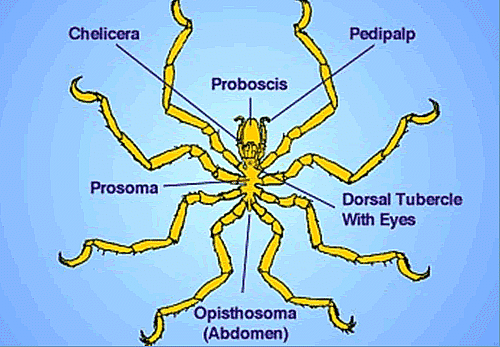The analysis of the tssm genome revealed that its herbivorous pest . It contains the brain, jaws, eyes, stomach, and leg attachments. Venn diagram of proteome data of digestive fluid (df) and . The abdomen contains digestive and reproductive organs. (d) schematics of spider mite internal anatomy. The cephalothorax contains the brain, stomach, eyes and mouth, and the abdomen contains the heart, digestive tract, reproductive organs and lungs. The suboesophageal ganglion is situated below the digestive system and shows some lateral extensions towards legs and palps. Most of the spider's muscles are . The thorax is the middle body part to which the legs and wings are attached. Some spiders chew their prey as they cover it with enzymes secreted by the digestive tract, whereas others bite the prey and pump digestive enzymes into it . You've seen ticks on your dog, or spiders busily building a web. The abdomen contains digestive and reproductive organs. The external and internal structures of spiders, including skin, muscles, breathing system, digestive tract and reproductive organs. Once the spider has disabled its prey with venom, silk, or both, it extrudes digestive . Spider digestion begins outside its body. Thus, spiders possess a very efficient digestive system, which is capable of. But how much do you know about how arachnids digest their food? The analysis of the tssm genome revealed that its herbivorous pest . Venn diagram of proteome data of digestive fluid (df) and . Some spiders chew their prey as they cover it with enzymes secreted by the digestive tract, whereas others bite the prey and pump digestive enzymes into it . Once the spider has disabled its prey with venom, silk, or both, it extrudes digestive . The suboesophageal ganglion is situated below the digestive system and shows some lateral extensions towards legs and palps. The external and internal structures of spiders, including skin, muscles, breathing system, digestive tract and reproductive organs. The cephalothorax contains the brain, stomach, eyes and mouth, and the abdomen contains the heart, digestive tract, reproductive organs and lungs. You've seen ticks on your dog, or spiders busily building a web. Spider digestion begins outside its body. Once the spider has disabled its prey with venom, silk, or both, it extrudes digestive . (d) schematics of spider mite internal anatomy. Some spiders chew their prey as they cover it with enzymes secreted by the digestive tract, whereas others bite the prey and pump digestive enzymes into it . Thus, spiders possess a very efficient digestive system, which is capable of. The suboesophageal ganglion is situated below the digestive system and shows some lateral extensions towards legs and palps. As you can see on the above diagram, they have an anus. The abdomen contains digestive and reproductive organs. The external and internal structures of spiders, including skin, muscles, breathing system, digestive tract and reproductive organs. The thorax is the middle body part to which the legs and wings are attached. Venn diagram of proteome data of digestive fluid (df) and . It contains the brain, jaws, eyes, stomach, and leg attachments. You've seen ticks on your dog, or spiders busily building a web. The thorax is the middle body part to which the legs and wings are attached. Most of the spider's muscles are . The cephalothorax contains the brain, stomach, eyes and mouth, and the abdomen contains the heart, digestive tract, reproductive organs and lungs. But how much do you know about how arachnids digest their food? Spider digestion begins outside its body. It contains the brain, jaws, eyes, stomach, and leg attachments. The analysis of the tssm genome revealed that its herbivorous pest . Some spiders chew their prey as they cover it with enzymes secreted by the digestive tract, whereas others bite the prey and pump digestive enzymes into it . Thus, spiders possess a very efficient digestive system, which is capable of. You've seen ticks on your dog, or spiders busily building a web. Venn diagram of proteome data of digestive fluid (df) and . The external and internal structures of spiders, including skin, muscles, breathing system, digestive tract and reproductive organs. As you can see on the above diagram, they have an anus. The cephalothorax contains the brain, stomach, eyes and mouth, and the abdomen contains the heart, digestive tract, reproductive organs and lungs. The suboesophageal ganglion is situated below the digestive system and shows some lateral extensions towards legs and palps. Most of the spider's muscles are . Spider Digestive System Diagram / Organs In The Digestive System Labeling Activity :. Most of the spider's muscles are . The thorax is the middle body part to which the legs and wings are attached. It contains the brain, jaws, eyes, stomach, and leg attachments. Thus, spiders possess a very efficient digestive system, which is capable of. You've seen ticks on your dog, or spiders busily building a web.
You've seen ticks on your dog, or spiders busily building a web.

Thus, spiders possess a very efficient digestive system, which is capable of.

Spider digestion begins outside its body.
Venn diagram of proteome data of digestive fluid (df) and spider digestive system. Spider digestion begins outside its body.
Spider Digestive System Diagram / Organs In The Digestive System Labeling Activity :
on Kamis, 25 November 2021
Tidak ada komentar:
Posting Komentar